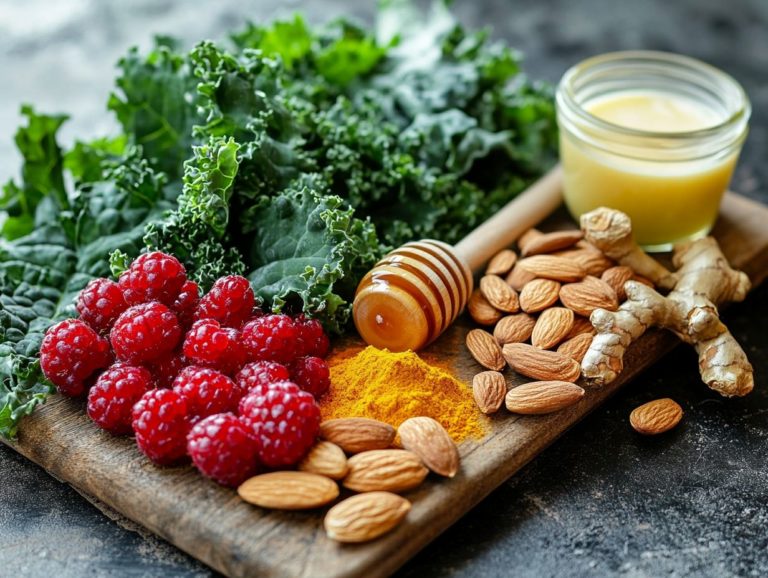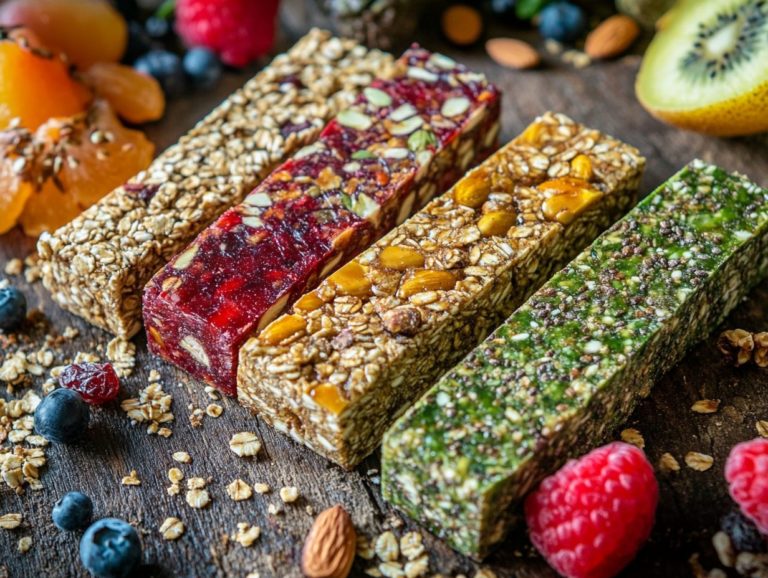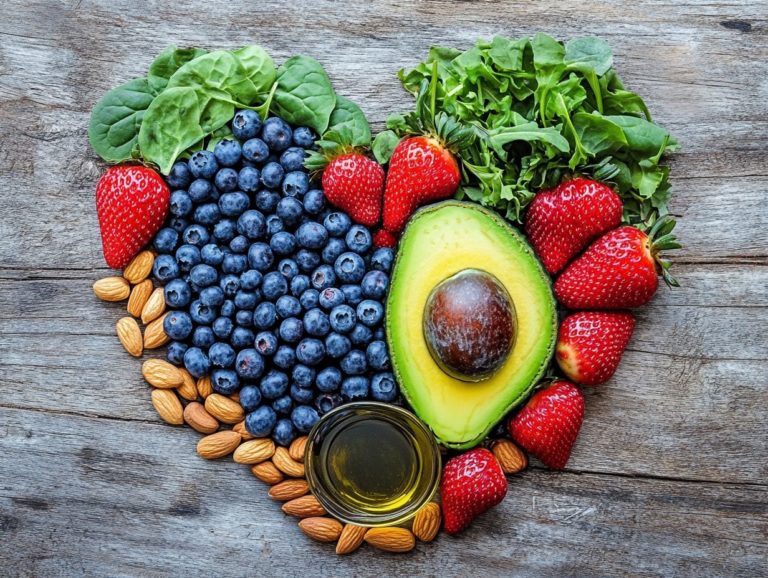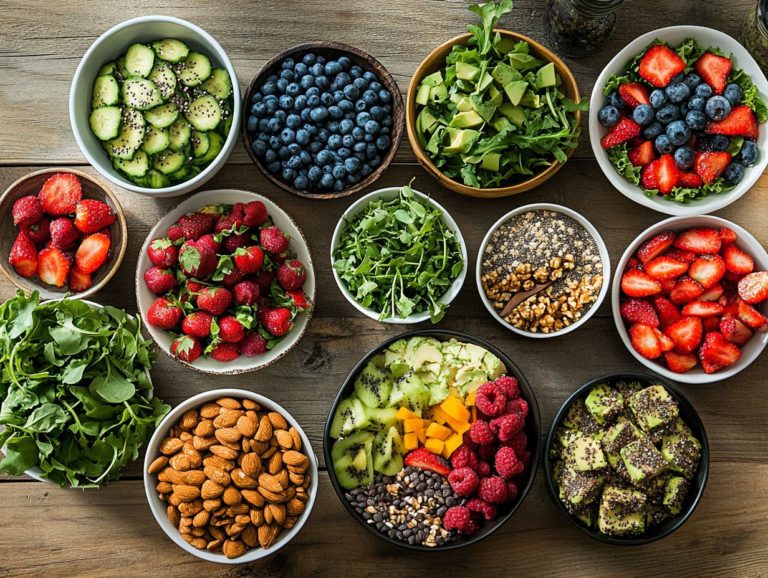How to Incorporate Spirulina into Your Meals
Spirulina, the vibrant blue-green algae, has certainly made a name for itself as a superfood full of nutrients and health benefits.
In this article, you ll delve into what spirulina is all about, explore its impressive nutritional profile, and discover how it can elevate your overall well-being.
You ll also find practical ways to incorporate this powerhouse ingredient into your meals, complete with delicious recipes and helpful tips.
We ll discuss potential risks and safety considerations, ensuring that you can fully enjoy the benefits of spirulina while being mindful of your health.
Join in as you uncover the wonders of spirulina!
Contents
- Key Takeaways:
- What is Spirulina?
- Benefits of Adding Spirulina to Your Diet
- Ways to Incorporate Spirulina into Your Meals
- Potential Risks and Precautions
- Frequently Asked Questions
- What is spirulina and why should I incorporate it into my meals?
- How can I incorporate spirulina into my meals?
- Are there any potential health benefits of incorporating spirulina into my meals?
- Is spirulina safe to cook with?
- How much spirulina should I add to my meals?
- Are there any precautions I should take when incorporating spirulina into my meals?
Key Takeaways:
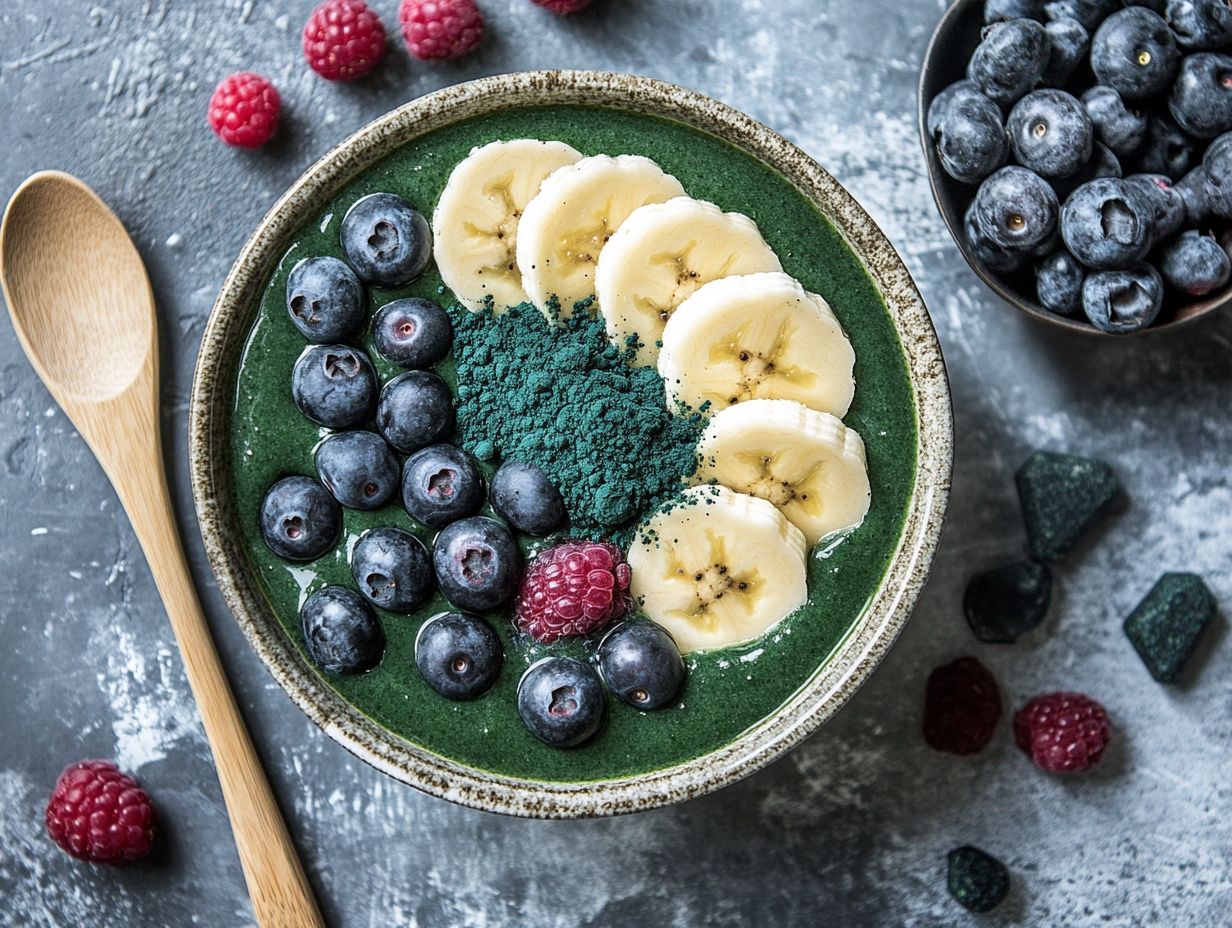
- Including spirulina in your meals can enhance your nutrient intake and provide various health benefits.
- There are numerous ways to incorporate spirulina, such as adding it to smoothies, soups, and baked goods.
- Before using spirulina, consider potential risks and take necessary precautions, such as consulting with a healthcare professional and purchasing from a reputable source.
What is Spirulina?
Spirulina, often celebrated under the captivating name Blue Majik, is a blue-green algae recognized for its remarkable health benefits. This superfood is full of vitamins, minerals, and antioxidants, making it a favored choice for health enthusiasts eager to elevate their diets.
You can enjoy spirulina in various forms, such as powdered spirulina, which seamlessly blends into smoothies, energy balls, and even savory dishes, delivering a potent infusion of nutrition.
Overview and Nutritional Profile
The nutritional profile of spirulina is truly remarkable. It offers a wealth of vitamins, minerals, and antioxidants that significantly enhance your overall health and well-being.
This blue-green algae is rich in essential vitamins like B1 (thiamine), B2 (riboflavin), and B3 (niacin), as well as vital minerals such as iron, magnesium, and calcium. Antioxidants, which are substances that help protect your cells from damage, like phycocyanin and beta-carotene, play key roles in neutralizing harmful molecules that contribute to oxidative stress. This happens when harmful molecules build up in the body, which can lead to various health problems.
Research, including studies from the University of Southern California, underscores spirulina’s potential benefits, showcasing its ability to strengthen immune function and support cardiovascular health. By adding spirulina to your diet, you can harness these powerful nutrients for enhanced vitality and longevity.
Benefits of Adding Spirulina to Your Diet
Start adding spirulina to your diet today and enjoy its amazing health benefits! It enhances your nutrient intake significantly and boasts remarkable detoxifying properties that promote your overall health and wellness.
Improved Nutrient Intake and Health Benefits
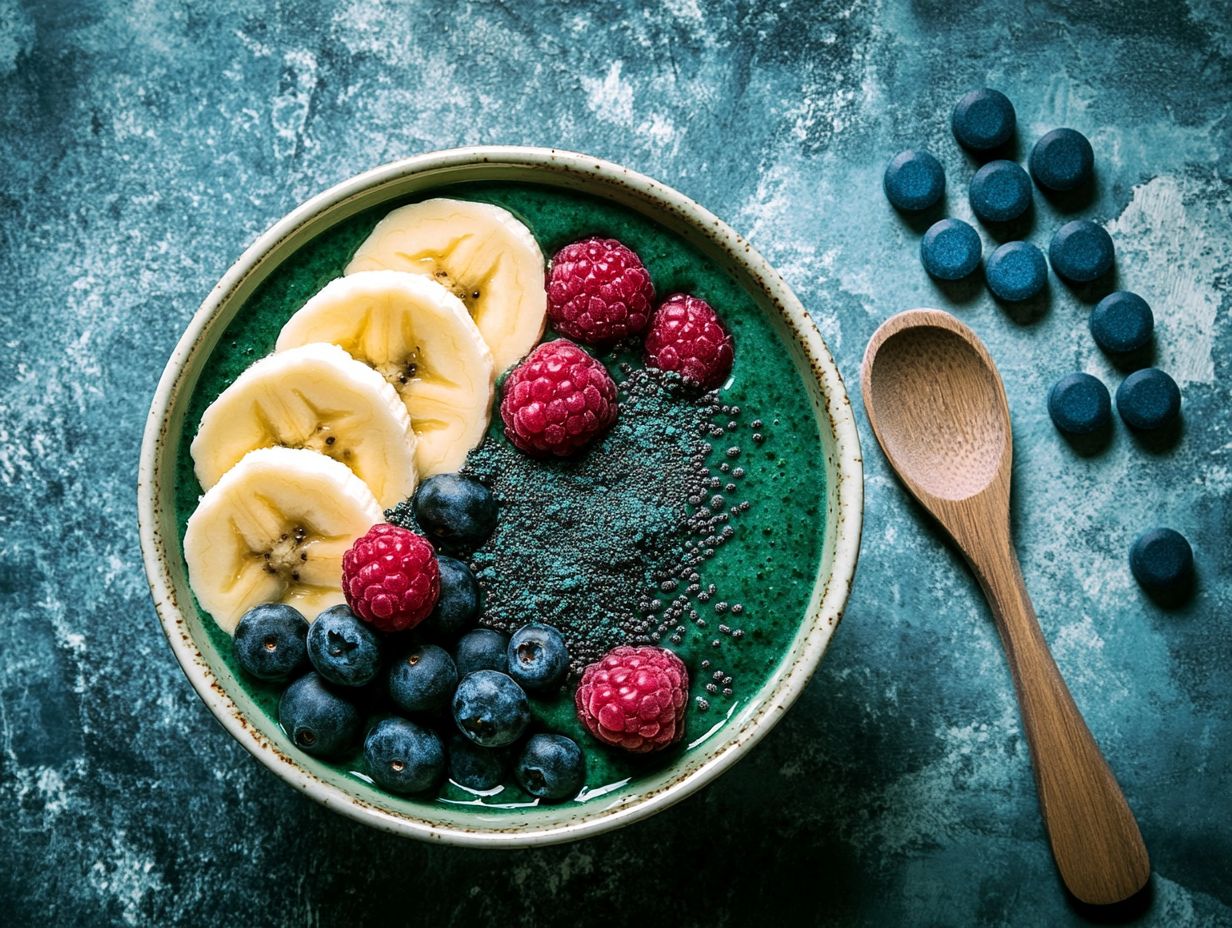
One of the standout features of spirulina is its remarkable ability to enhance your nutrient intake. It offers a concentrated source of essential nutrients vital for maintaining optimal health.
This superfood shines with its high-quality protein content, boasting all nine essential amino acids that support muscle repair and overall body function. It’s brimming with essential vitamins such as A, B1, B2, and B12, which help boost your energy levels and enhance your overall wellness. The mineral content, including iron and magnesium, further contributes to improved metabolic processes, making it a powerhouse for your health.
Incorporating spirulina into your daily meals is easy. You can:
- Add it to vibrant smoothie bowls,
- Blend it into creamy chia pudding,
- Mix it into energy balls for a nutritious snack.
By doing so, you not only elevate your nutrient intake but also indulge in a delightful variety of flavors.
Ways to Incorporate Spirulina into Your Meals
Incorporating spirulina into your meals can be effortless and enjoyable. For more ideas, check out this guide on how to incorporate superfoods into your meal plan, which offers a wide array of recipes that cater to various tastes and dietary preferences.
Whether you re a seasoned culinary enthusiast or simply exploring new flavors, there s a spirulina dish that can elevate your dining experience.
Don t wait! Start adding spirulina to your meals today for a boost of health and vitality!
Recipes and Tips for Adding Spirulina
Start your day with a vibrant Spirulina Smoothie bursting with fruits like bananas and berries. You could also sip on a refreshing Spirulina Juice that perfectly balances its earthy notes with a hint of citrus zest. There are countless ways to weave this nutrient-rich food into your meals.
Try making Spirulina Pasta, using your favorite dough infused with a subtle green hue it’s sure to impress at dinner parties. To soften the distinctive flavor of spirulina, blend it with creamy coconut oil or rich chocolate for an indulgent twist.
By experimenting with different combinations, you’ll discover delicious meals that elevate your everyday dining experience.
Potential Risks and Precautions
While spirulina offers numerous health benefits, it s important to consider the potential risks and necessary safety precautions linked to its consumption, especially when using powdered spirulina.
Safety Considerations for Using Spirulina
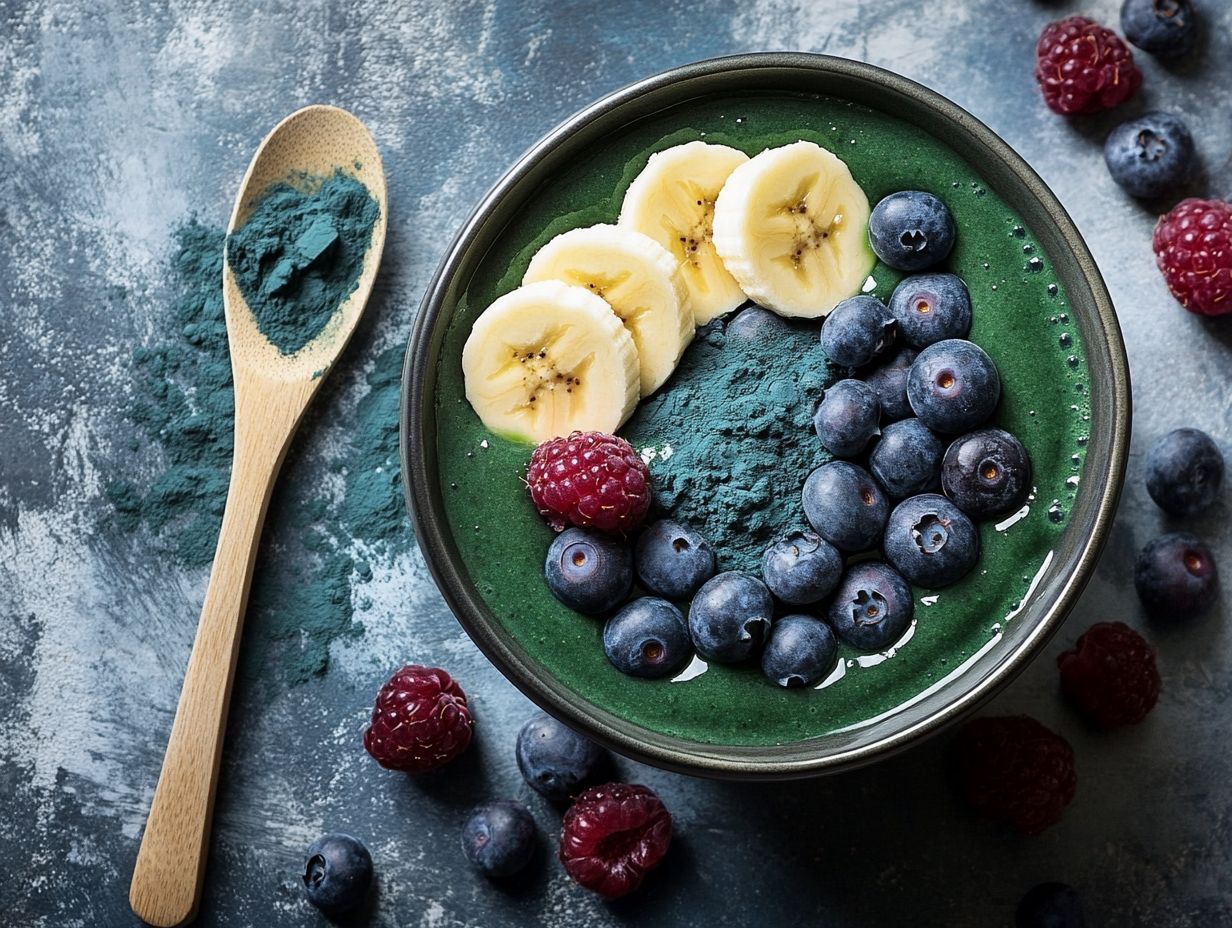
When incorporating spirulina into your diet, pay attention to safety considerations regarding dosage and be mindful of potential contaminants that could impact its quality.
Getting the dosage right is crucial; generally, a daily intake of 1 to 3 grams is recommended for most individuals. It s wise to choose a reputable brand that rigorously tests for harmful substances, such as heavy metals or harmful bacteria, which can sometimes lurk in lower-quality spirulina products.
Consulting a healthcare professional is advisable, especially if you have pre-existing health conditions or are pregnant. They can offer personalized advice on safe consumption practices and help you navigate any potential interactions with medications.
Frequently Asked Questions
What is spirulina and why should I incorporate it into my meals?
Spirulina is a type of blue-green algae that is full of nutrients and has been hailed as a superfood. It is rich in protein, vitamins, and minerals, making it a great addition to any diet.
How can I incorporate spirulina into my meals?
Spirulina can easily be added to smoothies, soups, salads, or even baked goods. To learn more about this, check out how to incorporate superfoods into family meals. You can also mix it into dips, sauces, and spreads for a nutrient boost.
Are there any potential health benefits of incorporating spirulina into my meals?
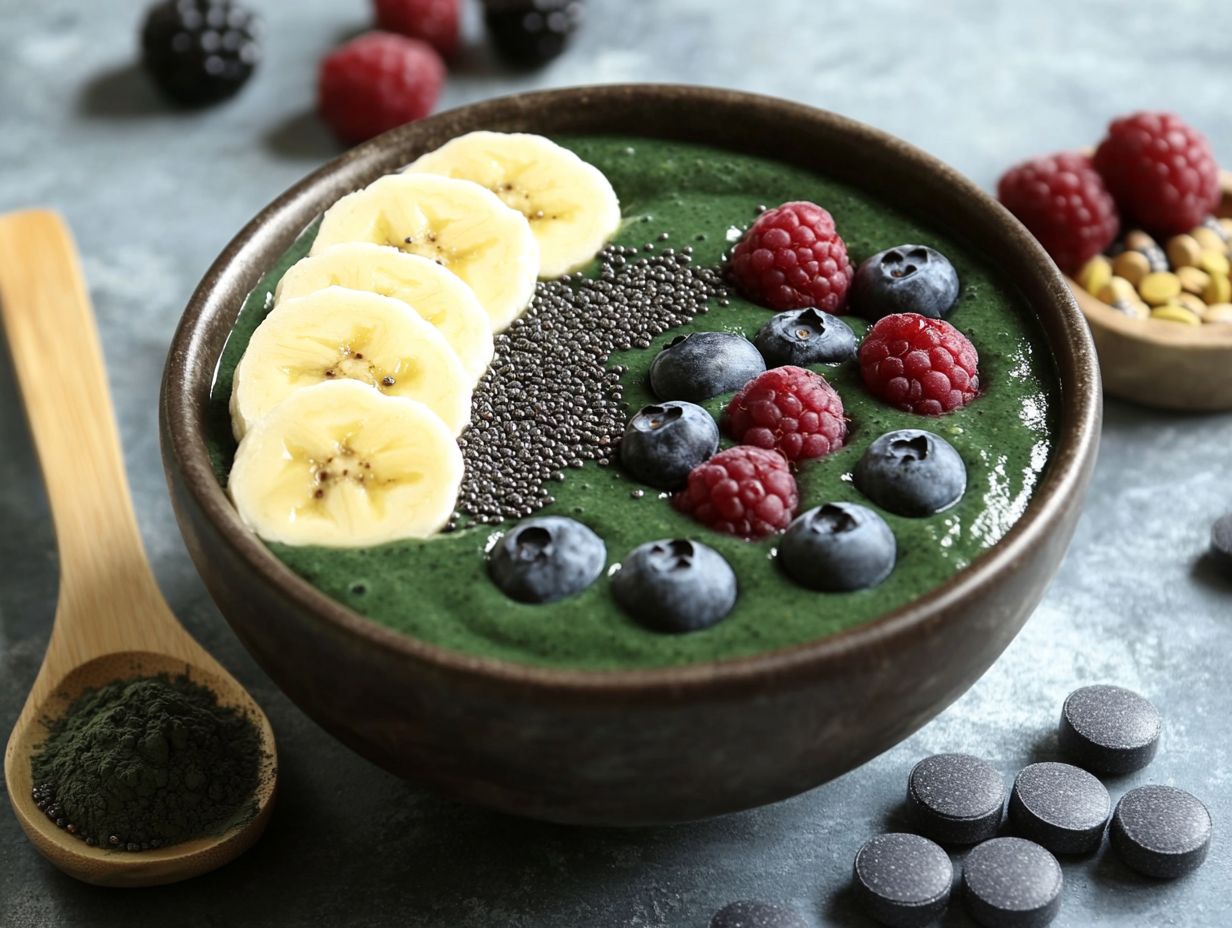
Yes, incorporating spirulina into your meals can offer many health benefits, such as improving immune function, increasing energy levels, and even lowering cholesterol and blood pressure.
Is spirulina safe to cook with?
Yes, spirulina is heat stable, so you can add it to cooked dishes without losing its nutritional value. Just be sure to add it towards the end of cooking to avoid overheating.
How much spirulina should I add to my meals?
The recommended daily dose of spirulina is 1-3 grams. Start by adding 1 teaspoon to your meals and adjust the amount based on your preference. It is always best to consult with a healthcare professional for personalized recommendations.
Are there any precautions I should take when incorporating spirulina into my meals?
If you have a seafood or iodine allergy, consult with a healthcare professional before adding spirulina to your meals. It may also interact with certain medications, so seek medical advice if you have any underlying health conditions or are taking any medications.

